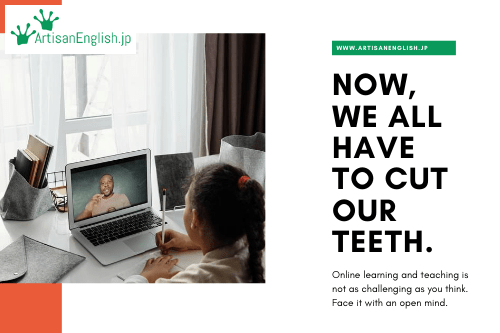
YouTube / iTunes / Spotify / Radio Public / Pocket Casts / Google Podcasts / Breaker / Overcast
Listen to ArtisanEnglish.jp posts & lesson intros here.
Idiom: Cut your teeth
Initially, none of us have experience.
It’s something every one of us has had to acquire.
When attempting something new, we are not perfect at it and require guidance and practice.
That’s what it means to cut your teeth.
You gain practice and experience at something.
Often you cut your teeth on something easy and then move on to more complicated or advanced aspects of an activity.
For example, when I began teaching English, I cut my teeth on simple daily conversations.
Believe me, my knowledge of the English language was pretty basic.
Sure, I could speak it quite well and had an undergraduate degree, but speaking a language and teaching a language are quite different.
Then I came to Japan.
I cut my teeth in Japan, working for AEON.
That was a great experience because the level of teaching and professionalism expected was relatively high.
After I moved to Kyoto, I then had an opportunity to further cut my teeth, teaching children.
Wow! That was an experience.
Next, I moved on to working at public high schools, where I taught myself how to create listening exams and judge students’ abilities from presentations.
All of those experiences prepared me for online teaching.
I thought so, anyway.
They didn’t.
Teaching online is a different ballgame.
Once more, I had to cut my teeth before I became an entrepreneur.
So what does that tell you?
In life, learning never stops, and whenever you attempt to do something new, you first have to cut your teeth.
Flesch-Kincaid Readability Test
This post is understandable by someone with at least an 8th-grade education (age 13 – 14).
On the Flesch-Kincaid reading-ease test, this post scores 70.
The easier a passage is to read, the higher the score on a scale of 0 – 100.

